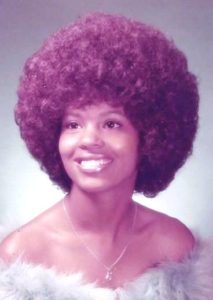 One of the greatest joys of my life was traveling from St. Louis, Missouri to Oakland, California to visit my cousin Cheryl Gray Wilhite. My parents took my brother and me on road trips every year to different parts of the country, but once I discovered California, I didn’t want to travel anyplace else. I dreamed of moving there. I fell in love with the ocean, sunshine, and palm trees, and I was so thrilled about having a cousin there who was my age. When I got old enough to travel on my own, I saved the money from my job at the Velvet Freeze ice cream store so I could fly out to California to see my cousin.
One of the greatest joys of my life was traveling from St. Louis, Missouri to Oakland, California to visit my cousin Cheryl Gray Wilhite. My parents took my brother and me on road trips every year to different parts of the country, but once I discovered California, I didn’t want to travel anyplace else. I dreamed of moving there. I fell in love with the ocean, sunshine, and palm trees, and I was so thrilled about having a cousin there who was my age. When I got old enough to travel on my own, I saved the money from my job at the Velvet Freeze ice cream store so I could fly out to California to see my cousin.
The last time I visited her in 1973, she was so excited about her church and the pastor whom she called “Jim.” My cousin seemed so happy. She talked incessantly about “Jim.”
Cheryl explained to me how “Jim” told his congregation members to bathe and wash their hair in cold water because hot water killed body cells. She said “Jim” didn’t approve of them going to physicians and that he prescribed vitamins to her and her boyfriend for kidney infections. She took me to visit the church, and although I was attending as her guest, I was detained at the entrance while she, her boyfriend, and her mother were allowed to enter. I had to answer a barrage of questions including, “What’s your name?” “How old are you?” “What do you think about political prisoners?” “How do you feel about the Zebra killings?” The woman with the pad and pencil who had been firing questions at me then proceeded to search my body and purse for concealed weapons. She smiled warmly and remarked, “We have to protect Jim.”
Once I was allowed to enter the church, I saw a congregation of about 1,000 people of all different races and ages. The majority of the congregation was African American. In the front of the church were two pews full of children of all races. Cheryl, sensing my fascination with the children, leaned over and proudly informed me that Jim had arranged for the church to adopt all of them. During the church service that seemed to last all day, Jim Jones would appear and exit through two wooden doors on the pulpit. At one point he appeared with several puppies and held them up one by one and asked which congregation member wanted to adopt them. He then began healing people stricken with cancer and other ailments. As we were leaving the church, I noticed at least a dozen huge coach buses on the parking lot. My cousin told me that Jim had purchased the buses for the church because he felt soon the United States would be destroyed. With the buses, he would take the congregation to a safe place.
As a 19-year-old, I didn’t see anything wrong with the church. After leaving California, my attempts to reach my cousin were fruitless. Letters came back with no forwarding address. My grandmother and parents had heard that our family in California had moved, but they didn’t know where. In 1978, my grandmother received a letter from Cheryl’s grandmother from Guyana in South America. She said they were all living there, including Cheryl, and that everything was fine and they had plenty to eat. My grandmother thought the letter seemed cold and that it had been censored. Soon we began to hear rumors about Jonestown – Jim was taking the social security checks and money of the congregation members and they were being forced to stand in barrels of cold water for punishment. A friend of our family tried to find out several times what was going on in Guyana, but attempts were unsuccessful.
Cheryl, her mother, grandmother, boyfriend, and two children died in the Jonestown massacre. Cheryl was only 23 years old when she died. Cheryl lived a quiet simple life. She was very beautiful, but she didn’t seek attention or glamour. She was a very compassionate caring person. Last time I saw her in California, she was so happy and full of life. I never heard from her again. I cherish the time I got to spend with Cheryl over the years and still shudder to think what her life was like as a young mother, a wife, a daughter, and a granddaughter in Jonestown.
(Daphne Walker-Thoth is the cousin of Cheryl Gray Wilhite, who died in Jonestown. Daphne retired from the faculty of the University of Missouri’s Institute of Mental Health in 2009. She has a master’s degree in education and holds the honorary title of retired substance abuse counselor emeritus from the Missouri Professional Credentialing Board. Daphne has received numerous awards for organizing Missouri’s statewide substance abuse faith initiative. On December 9, 2008, she spoke at the White House as part of a national panel on building the capacity of faith organizations to address social service issues. She may be contacted through this website.)